Spring 2008 Newsletter
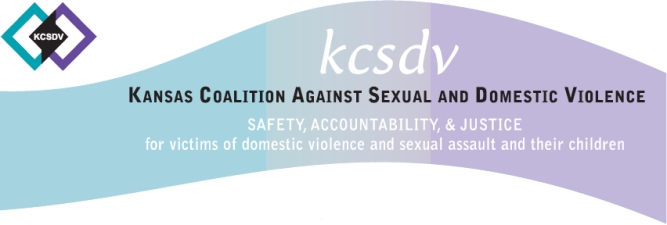
More than 300 advocates and allies of KCSDV’s 30 member programs descended upon the Kansas Statehouse in January to make their voices heard on behalf of victims of sexual and domestic violence, dating violence, and stalking. They participated in KCSDV’s fifth annual Safe Homes, Safe Streets event.
The event included a press conference, training for advocates, visits with state legislators, and a public reception.
KCSDV laid out its legislative agenda during the press conference, voicing its support of amending the current stalking law and creating a mechanism to track domestic violence cases as they progress through the criminal justice system. Other press conference speakers were Rep. Kasha Kelley, R-Arkansas City, and Bob Stephan, former Kansas attorney general and current chairman of the Governor’s Domestic Violence Fatality Review Board.
“What brings me here and what brings me to address the issue of stalking is a very sad case,” Kelley said, referring to the stalking murder of 19-year-old Jodi Sanderholm of Arkansas City in 2007. Kelley is sponsoring a bill to redefine stalking to make it easier for authorities to prosecute the crime. KCSDV supports Kelley’s bill, which built upon the work of the Kansas Judicial Council.
For more information about KCSDV’s legislative agenda, contact Sandy Barnett or Joyce Grover at 785-232-9784.
Corporate Track
This year at the Safe Homes Safe Streets event, KCSDV partnered with Blue Cross and Blue Shield of Kansas, an event sponsor, to provide a briefing for businesses on domestic violence in the workplace. Marlou Wegener, Blue Cross’ community relations manager, provided information on how businesses can develop a workplace policy that addresses victim safety, perpetrator accountability and worker safety. Sandy Barnett, KCSDV executive director and Eileen Doran, executive director of the YWCA Battered Women Task Force in Topeka, discussed what domestic violence looks like in a workplace environment.

Corporate track speakers were (from left to right): Marlou Wegener, community relations manager with Blue Cross and Blue Shield of Kansas; Sandy Barnett, executive director of KCSDV; and Eileen Doran, executive director of the YWCA Battered Women Task Force.
For more information about the corporate track and partnering opportunities, contact Mary Bradshaw, economic justice team leader, at: mbradshaw@kcsdv.org or 785-232-9784.
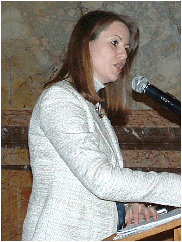
Rep. Kasha Kelley, R-Arkansas City, speaks during the press conference.
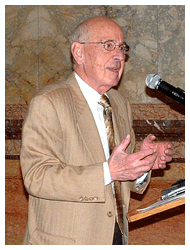
Bob Stephan, chairman of the Governor’s Domestic Violence Fatality Review Board, speaks during the press conference.
The Safe Homes, Safe Streets reception included comments from Sandy Barnett (not pictured) and pictured left (from left to right): Dorthy Stucky Halley, statewide victims rights coordinator with the Office of the Attorney General; Marlou Wegener, community relations manager with Blue Cross and Blue Shield of Kansas; and Juliene Maska, administrator with the Federal and Other Grants Programs in the Office of the Governor. Both Stucky Halley and Maska are previous recipients of KCSDV’s Advocate of the Year award, named in honor of Maska.
Honoring Advocates and Allies
During the Safe Homes, Safe Streets reception, KCSDV honored two advocates, one project and five allies for their work on behalf of victims. Recipients of the advocate of the year award were Lisa O’Dell-Davis and Laura Patzner. Recipient of the project of the year award was Advocates for Sexual Assault Prevention, a project of SAFEHOME, a KCSDV member program in Overland Park. Recipients of the ally of the year award were Shirley Adams; Wendy Blank; Tim O’Donnell; Joyce Vancrum; and the Women’s Initiative Network.
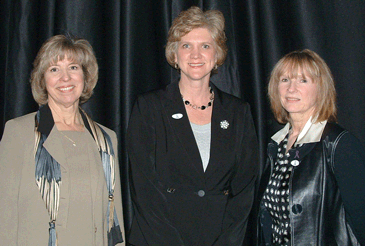
Advocate of the Year Honorees
Since 1995 KCSDV has recognized outstanding advocates employed by one of the 30 KCSDV member programs across Kansas. The award is named after its first recipient, Juliene Maska, a longtime advocate for victims’ rights in Kansas who now oversees the Kansas Governor’s Grants Program, which administers the federal and state funding addressing sexual and domestic violence.
Lisa O’Dell-Davis is the director Catholic Charities Harbor House, a KCSDV member program in Wichita. She also serves as chairwoman of the Wichita/Sedgwick County Domestic Violence/Sexual Assault Coalition. Her fellow Coalition member, Kathy Williams, nominated her. O’Dell-Davis was recognized for her work mobilizing the Coalition to broaden its focus to include sexual violence and to seek an organizational structure that would allow it to advocate for victim safety and perpetrator accountability.
Laura Patzner is the executive director of Family Crisis Center, a KCSDV member program located in Great Bend. She has worked at the Center for more than 17 years. The staff who nominated Patzner described her as a tireless and dedicated advocate who has pitched in when the agency needed it, especially when the agency was transitioning between directors. She recently became the Center’s executive director.
Project of the Year Honoree
Advocates for Sexual Assault Prevention (ASAP) received the Project of the Year award, an honor given to an innovative project of one of KCSDV’s member programs. ASAP is a project of SAFEHOME of Overland Park. Allison Basinger, the education and prevention advocate who staffs the project, accepted the award. ASAP is a community-based prevention coalition that recently conducted a needs assessment of sexual assault and dating violence in Johnson County and plans to educate coaches, parent-teacher groups and fathers’ groups in 2008.
Ally of the Year Honorees
KCSDV also recognizes outstanding community members who work to address sexual and domestic violence and dedicate their own time to the cause. This year the Coalition honored five individuals and/or agencies across the state with the ally of the year award. They are Shirley Adams; Wendy Blank; Tim O’Donnell; Joyce Vancrum; and the Women’s Initiative Network.
For more than 20 years Shirley Adams has been a board member of the Northwest Kansas Domestic & Sexual Violence Services, a KCSDV member program in Hays. When the organization has asked for her help, she automatically replies, “Yes. What can I do?” She was pivotal in finding a new shelter for the organization when it became clear that remodeling the current shelter would not be cost effective. The staff of the program nominated Adams.
Dr. Wendy Blank is doctor at the student health center on the campus of Kansas State University. She was nominated by Judy Davis, executive director of the Crisis Center, Inc., a KCSDV member program in Manhattan. Blank was recognized for her leadership in helping establish the city’s sexual assault nurse examiner/sexual assault response team program, her longtime dedication to addressing violence against women, and her commitment to providing expertise during the Crisis Center’s volunteer trainings.
Tim O’Donnell is a major account executive at CareerBuilder.com and an accomplished triathlon runner who completed the Ironman Florida competition in November as a fundraiser on behalf victims of domestic violence. He became involved in the issue after supporting his sister when she realized she was a victim of domestic violence. O’Donnell was nominated by Kit Lambertz, program director of StepStone, a KCSDV member program in Wichita.
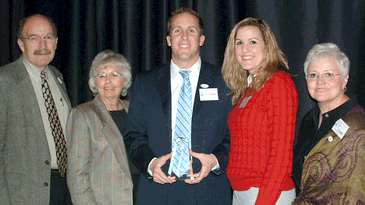
Tim O’Donnell, a recipient of the Ally of the Year award, is joined by his family (from left to right): his dad Pat, mom Linda, sister Trish, and family friend Kit Lambertz, who nominated Tim for the award.
Joyce Vancrum is a counselor in private practice in Johnson County. She was nominated by Sharon Katz, executive director of SAFEHOME, a KCSDV member programs located in Overland Park. Vancrum was recognized for her leadership during SAFEHOME’s major fundraiser, her six years of service on the board of directors including terms as president and vice president, and her time volunteering at the shelter.
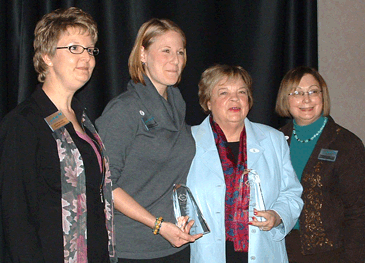
Joyce Vancrum (second from the right) receives the Ally of the Year award. Advocates for Sexual Assault Prevention, a project of SAFEHOME, receives the Project of the Year award. Accepting on its behalf was Allison Basinger (second from left), education and prevention advocate. Also pictured are Janee’ Hanzlick (far left) and Sharon Katz (far right) of SAFEHOME.
The Women’s Initiative Network (WIN) is a non-profit agency located in Wichita. that was recognized for its work providing assistance to women transitioning from domestic violence and/or homelessness. WIN provides a safe and supportive environment where women gain job training skills, set educational and financial goals, and receive emotional support and assistance to obtain full-time employment. It was nominated by Lisa O’Dell-Davis, director of Catholic Charities Harbor House in Wichita.
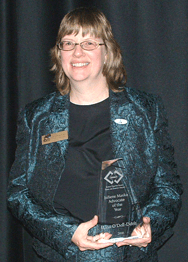
Lisa O’Dell-Davis, Wichita, receives the Juliene Maska Advocate of the Year award.
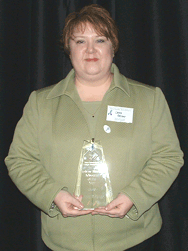
Laura Patzner, Great Bend, receives the Juliene Maska Advocate of the Year award.
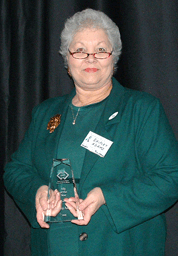
Shirley Adams, Hays, receives the Ally of the Year award.
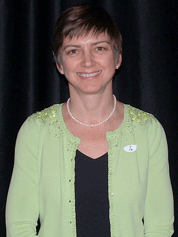
Dr. Wendy Blank,Manhattan, a doctor at Kansas State University’s student health center, receives the Ally of the Year award.
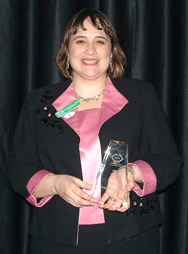
Kelley Rogers-Graham, executive director of the Women’s Initiative Network, accepts the Ally of the Year award on its behalf.
 Results from the first domestic violence survey in Kansas were released in September by Kansas Governor Kathleen Sebelius.
Results from the first domestic violence survey in Kansas were released in September by Kansas Governor Kathleen Sebelius.
“We’re thrilled that finally we have Kansas-specific data available,” said Sandy Barnett, executive director of KCSDV. “It shows the positive impacts our member programs’ services have on victims of domestic violence, but also demonstrates the great need for even more services in Kansas.”
Completed by the Docking Institute of Public Affairs at Fort Hays State University in cooperation with the Governor Sebelius’ Office, the survey assessed what domestic violence looks like in Kansas and the impact services have on victims.
Report’s Policy Considerations
- Promote successes of victims who have used victim services
- Increase awareness of victim services
- Increase dissemination of brochures by law enforcement
- Address abuser’s access to firearms
- Address transportation barriers
- Examine needs of large town domestic violence advocacy programs
- Reduce childcare barriers
- Educate children and teens
- Ensure health care benefits for victims
- Address the needs of the Hispanic community
- Address the needs of children raised in families with domestic violence abusers
The survey was made up of two parts – a telephone survey of the adult women in Kansas and a survey of domestic violence victims receiving services from domestic violence advocacy programs. All of these programs were KCSDV member programs.
Survey of Adult Kansas Women
Researchers administered a telephone survey to more than 2,500 adult Kansas women (aged 17 years and older) between May 2006 and January 2007. It found an overall domestic violence victimization rate of 10.1%. That means that ten percent of adult Kansas women were victims of physical, sexual, verbal, and/or controlling behavior abuse during this past year.
Extrapolating this percentage to the latest Census figures, an estimated 106,419 adult women in Kansas were victims of domestic violence in 2006.
More than 90% of Kansas women agreed or strongly agreed that domestic violence was a widespread statewide problem. Women also believed that domestic violence was the third most important women’s health issue, ranking just behind cancer and heart disease.
“Advocates have always known that domestic violence affects all facets of life, including health,” Barnett said. “But to have women rank it as the third most important health issue concerning them is disturbing.”
Women reported experiencing physical, sexual and verbal abuse.
“This is striking because often people recognize physical assaults as the only type of domestic violence,” Barnett said. “Advocates have long known that soul-numbing verbal abuse can have long-lasting, devastating effects.”
Perhaps more striking is the fact that approximately one-third of all Kansas women currently know someone, not including themselves, who is a victim of domestic violence.
Victims’ Services Survey
Women receiving shelter and advocacy services from one of the 24 domestic violence advocacy programs in Kansas were given a survey about the quality of the services and the impact services had on their lives. Two hundred fifty-six women completed the survey.
Victims reported high rates of satisfaction with services – more than 90% reported being “very satisfied” with one-on-one counseling, court preparation support and follow-up assistance.
“I’m pleased that victims report they’re very satisfied with the advocacy services they have received,” Barnett said. “It is a testament to the hard work and dedication among advocates across the state.”
Victims also described how the services were helpful. The areas in which victims felt services were the most helpful were preparing them to make changes to improve their situation, helping them feel safer because of help received, and using skills they learned to improve their situation.
Since receiving domestic violence services, about 91% of victims indicated their situation had improved and approximately 86% reported that the amount of violence had decreased.
“This demonstrates how advocacy services can be life-changing and life-saving,” Barnett said. “Advocacy services often provide a lifeline to safety for victims and their children.”
The survey also demonstrates that domestic violence crosses all geographic barriers. Victims receiving services were nearly as likely to live in small towns (less than 10,000) as in mid-sized towns (10,000 to 50,000) and cities (more than 50,000).
“This shows that domestic violence is widespread and not unique to any one part of Kansas,” Barnett said.
Even though victims highly rated advocacy services they received, three out of five victims reported that didn’t know where to go to receive services when they first decided to get help.
“Obviously, we have a lot of work to do as a state to increase awareness of victims’ services,” Barnett said. “It will take the work of public and private sectors of our community to make this happen.”
To access the survey visit www.governor.ks.gov/grants/policies/docs/DockingReport.pdf.
It has been three years since Governor Kathleen Sebelius established the Domestic Violence Fatality Review Board. The Board reviews all adult domestic violence-related fatalities in Kansas, describes trends and patterns regarding the facts and circumstances of these fatalities, recommends improvements to prevent future fatalities, and determines if adequate resources and trainings are in place for those who respond to domestic violence crimes.
Since its inception the Board has released three annual reports. Bob Stephan, former Kansas attorney general and chair of the Board, said he was surprised by a few of the Board’s findings so far.
“I frankly have been amazed at the number of fatalities where there have been no reports of domestic violence and also where the family didn’t know about it either,” Stephan said.
Stephan said the Board will continue the Governor’s mandate in 2008 by reviewing more domestic violence fatalities, following through with its recommendations of training criminal justice system personnel, and finding funding for a statewide public awareness campaign.
“It’s pretty exciting to have at least the public awareness plan because I’ve always believed that we won’t cut into the problem and make headway with the legislators without raising public awareness,” he said.
A recent domestic violence survey of Kansas women confirms his view that public awareness is needed. Even though more than more than 90% of Kansas women agree or strongly agree that domestic violence is a widespread statewide problem, three out of five victims didn’t know where to go to receive services when they first decided to get help.
“That three out of five victims didn’t know where to go to get services clearly indicates a need for a statewide public awareness campaign,” said Sandy Barnett, executive director of KCSDV and member of the Board.
To find the Board’s reports, Stephan’s monthly columns, its press releases, and the Governor’s executive order establishing the Board, visit its website at www.governor.ks.gov/grants/gdvfrb.htm.
To access the Kansas domestic violence survey, visit www.governor.ks.gov/grants/policies/docs/DockingReport.pdf.
KCSDV and its member programs celebrated new funding for enhanced and expanded outreach services with a series of ten regional press conferences in October.
The Kansas Legislature allocated more than two million dollars in state general funds during the past two years to enhance and expand outreach services to underserved areas and underserved populations in Kansas. However, this funding comes in light of major federal funding cuts to other victims services programs.
“This funding will help to make sure that there are resources and services available and accessible to Kansans in more parts of our state,” said Sandy Barnett, executive director of KCSDV. “Providing expanded and enhanced services is critical to reaching victims in rural and remote areas of Kansas where geography presents significant barriers to accessing help.”
For example, Barnett said that often victims have to travel three or four and sometimes ten counties to get the services that they need.
“This fact is incredibly disturbing to us,” Barnett said, citing program service statistics that demonstrate that the farther away a victim lives from a county with services, the less likely she is to access those services. “We applaud our allies in the Legislature for recognizing this need.”
So far funding has enabled some programs to hire bilingual advocates, to open satellite offices, to increase the number of work hours of outreach advocates, and to make it possible for outreach advocates to travel to victims in rural and remote locations, rather than relying on victims to come to program offices.
“We thank the Legislature but recognize there is much more to do to end the violence,” Barnett said. “Until we can say there are no women in Kansas shot, stabbed, strangled, and sexually assaulted in their homes by their husbands, boyfriends, partners, and acquaintances, there is work to be done.”
Thank You
KCSDV thanks the following legislators for their participation and support:
Barbara Ballard – House Democrat
Virginia Beamer – House Republican
Oletha Faust-Goudeau – House Democrat
Jerry Henry – House Democrat
Laura Kelly – Senate Democrat
Bill Light – House Republican
Stephen Morris – Republican and Senate President
Melvin Neufeld –Republican and Speaker of the House
Vicki Schmidt – Senate Republican
Sharon Schwartz – House Republican
Dwayne Umbarger –Republican and Senate Ways and Means Chairman
Jim Ward – House Democrat and Assistant Minority Leader
David Wysong – Senate Republican
Concrete Strategies for Domestic Violence in Child Protection Cases
Working to address domestic violence in child protection cases and identify strategies for successful outcomes was the focus of a September two-day training in Topeka sponsored by KCSDV and the Kansas Department of Social and Rehabilitation Services. This invitation-only event brought together a combined audience of KCSDV member program advocates and administrators and child welfare workers from around Kansas for a multi-session training that also allowed participants to identify and establish community partnerships.
David Mandel, a nationally recognized expert in addressing the co-occurrence of child protection and domestic violence, engaged participants in an interactive seminar that focused on five critical building blocks of a good response to domestic violence and practical tips and tools to use when working with families. With 18 years experience working with domestic violence perpetrators and nine years working with child protection David was selected to oversee the development of a statewide network of domestic violence experts for Connecticut’s Department of Children and Families.
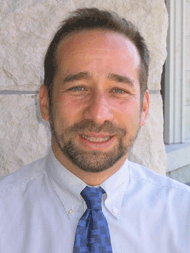
Asserting that an appropriate child protection response to the presence of domestic violence in a home is dependent upon several factors, Mandel discussed each in detail over the two-days, offering participants an opportunity to engage with each other regarding specific case examples. He also discussed the various ways batterers and their violence harm children, including:
- Exposure to the abuse which can include: direct observation, overhearing or knowing about the abuse
- Using children as a weapon against the children’s other parent
- Undermining the other person’s parenting efforts
- Accidentally causing physical harm to children as a result of the violence towards non-offending parent
- Physical/sexual/emotional abuse or neglect perpetrated directly against the children
Mandel offered recommendations regarding ways to successfully work with families involved with child protection services, including:
- Focus on reducing the risk that batterers create for children
- Consistently address batterers during the entire case
- Only substantiate against the batterer (when possible and appropriate)
- Articulate what the batterers need to do differently
- Partner with the victims of domestic violence
- Partner with courts and other community entities
For more information about children and domestic violence, contact Annie McKay, child welfare projects team leader at KCSDV, at amckay@kcsdv.org or 785-232-9784.
Developing policies addressing domestic and sexual violence committed by law enforcement officers and advocating on behalf of victims of this violence were the focus of three recent KCSDV trainings in October.
Diane Wetendorf, a consultant specializing in law enforcement-perpetrated domestic and sexual violence, provided trainings for both advocates and law enforcement. Wetendorf provides technical assistance to advocates and law enforcement agencies across the country, and is currently a consultant with the Battered Women’s Justice Project in Minnesota.
“Those who are abused by police officers and people in positions of power come to us with special needs,” said Sara Rustin-Martin, criminal justice projects attorney at KCSDV. “This training gave advocates the critical tools they need to help these victims.”
Wetendorf also provided training for law enforcement department management and supervisory personnel at the Kansas Law Enforcement Training Center in Hutchinson. It focused on a review of the International Chiefs of Police (IACP) model policy on police officer involved domestic violence. She offered law enforcement agencies the tools they need to evaluate and enforce a policy similar to that of the IACP.
For more information, contact Sara Rust-Martin, criminal justice projects team leader at KCSDV, at srust-martin@kcsdv.org or 785-232-9784.
Resources:
Diane Wetendorf, Inc., 847-749-2560 and www.abuseofpower.info
The second and final report of the Kansas Sex Offender Policy Board was published in January and is now available online at www.governor.ks.gov/grants/kcjcc_sopb.htm.
The Governor and the 2006 Kansas Legislature established the Board under the supervision of the Kansas Criminal Justice Coordinating Council (KCJCC). Senate Bill 506 established the Sex Offender Policy Board to consult and advise the KCJCC on issues and policies relating to the treatment, sentencing, rehabilitation, reintegration and supervision of sex offenders. The Board expires on June 30, 2008.
The final report addresses treatment and supervision standards for sex offenders, suitability of lifetime release supervision and safety education and prevention strategies for the public.
Developing policies addressing domestic and sexual violence committed by law enforcement officers and advocating on behalf of victims of this violence were the focus of three recent KCSDV trainings in October.
Diane Wetendorf, a consultant specializing in law enforcement-perpetrated domestic and sexual violence, provided trainings for both advocates and law enforcement. Wetendorf provides technical assistance to advocates and law enforcement agencies across the country, and is currently a consultant with the Battered Women’s Justice Project in Minnesota.
“Those who are abused by police officers and people in positions of power come to us with special needs,” said Sara Rustin-Martin, criminal justice projects attorney at KCSDV. “This training gave advocates the critical tools they need to help these victims.”
Wetendorf also provided training for law enforcement department management and supervisory personnel at the Kansas Law Enforcement Training Center in Hutchinson. It focused on a review of the International Chiefs of Police (IACP) model policy on police officer involved domestic violence. She offered law enforcement agencies the tools they need to evaluate and enforce a policy similar to that of the IACP.
For more information, contact Sara Rust-Martin, criminal justice projects team leader at KCSDV, at srust-martin@kcsdv.org or 785-232-9784.
Resources:
Diane Wetendorf, Inc., 847-749-2560 and www.abuseofpower.info
The second and final report of the Kansas Sex Offender Policy Board was published in January and is now available online at www.governor.ks.gov/grants/kcjcc_sopb.htm.
The Governor and the 2006 Kansas Legislature established the Board under the supervision of the Kansas Criminal Justice Coordinating Council (KCJCC). Senate Bill 506 established the Sex Offender Policy Board to consult and advise the KCJCC on issues and policies relating to the treatment, sentencing, rehabilitation, reintegration and supervision of sex offenders. The Board expires on June 30, 2008.
The final report addresses treatment and supervision standards for sex offenders, suitability of lifetime release supervision and safety education and prevention strategies for the public.
Mary Bradshaw joined KCSDV in December as Economic Justice Coordinator. Her experience in the violence against women movement includes five years with the Women Against Violence program at the Omaha YWCA. After moving to Topeka in 1998, Mary worked for eight years at Kansas Legal Services focusing on advocacy and program development that addressed anti-poverty and anti-oppression initiatives. She has a master’s degree in psychological counseling and a bachelor’s degree in secondary education.
Megan McCall joined KCSDV in January as the Outreach Advocacy Coordinator. She has worked and volunteered at the Crisis Center in Manhattan for several years, first as a police response advocate and then a shelter night staff. Megan will be graduating from Kansas State University in May with a bachelor’s degree in sociology with minors in Spanish and women’s studies.
Naz Shareef joined KCSDV as the Staff Assistant/Receptionist in April 2008. She worked for the State Department in Iraq for 5 years as a Translator/ Cultural Advisor. Naz graduated from Baghdad University with a Bachelor Degree in Arts ( English Literature) in June 2002.
Sarah Strick started with KCSDV as the Children’s Services Coordinator in January 2008. She graduated with her master’s degree in social work administration and advocacy from the University of Kansas 2006, and has worked in the area of child welfare for six years.
Jessica Vanderweide joined KCSDV in September as the Criminal Justice Team Staff Support Assistant. She has been active in women’s issues for the last four years. Jessica graduated from Kansas State University with her bachelor’s degree in interdisciplinary life sciences with concentrations in psychology and biology in August 2007.
Serena Wecker joined KCSDV in January as the Child Welfare Collaboration Coordinator. She has experience working with the Children and Family Services division at the Kansas Department of Social and Rehabilitation Services, which included investigating and assessing allegations of abuse and neglect and collaborating with community partners. Serena graduated from the University of Kansas with her bachelor’s degree in social work in 2003.
Gary West joined KCSDV in February as Protection Order Project Attorney. He was in private practice for eleven years prior to coming to KCSDV. He has also worked as a prosecutor for both the City of Wichita and the Shawnee County District Attorney. Gary graduated from Washburn University School of Law in 1994. While in law school he was named to the Order of Barristers and worked as a law clerk for the judges of the Third Judicial District.
KANSAS CRISIS HOTLINE: 888-END-ABUSE | 888-363-2287